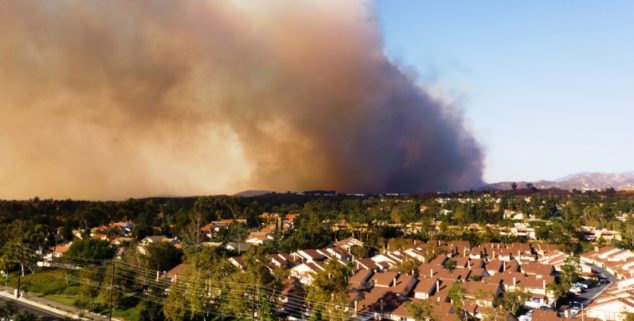News
Burning Californians: Insurers, policyholders and wildfires
 The 2020 Silverado Fire burns toward homes in Orange County, northeast of Irvine. (Photo: markmandersonfilms, via Shutterstock)
The 2020 Silverado Fire burns toward homes in Orange County, northeast of Irvine. (Photo: markmandersonfilms, via Shutterstock)Sarah Mapel bought her dream home in Santa Cruz County’s Boulder Creek neighborhood in 2018. Later, she purchased fire insurance through the Fair Access to Insurance Requirements (FAIR) plan, a state-mandated program for consumers unable to acquire such insurance due to high-risk factors. “It was quite expensive,” she said.
In 2020, the CZU Lightening Complex fires engulfed Mapel’s neighborhood. Two volunteer firefighters helped to save her home from burning, unlike eight of Mapel’s neighbors who lost their abodes to the wildfire. However, there was extensive inside damage to her home, from ash to debris and soot. Mapel’s home did not have water and power in the post-fire aftermath.
In time, Sarah Mapel hired an industrial hygienist and Danielle Matthews, a public adjuster.
“I met a FAIR plan adjuster in my home when the fire evacuation order lifted,” she told Capitol Weekly. “After that, FAIR plan did not receive the adjuster’s report nor reply to me. FAIR plan was not communicating with me, while cutting my fair market rental value by $2,000 per month. There is zero transparency around how they calculate FRV. That was pain and anger on top of terrible trauma.
“I kept calling FAIR plan for the adjuster’s report. I did not know what to do.” In time, Mapel, a program manager for a big tech firm in Silicon Valley, hired an industrial hygienist and Danielle Matthews, a public adjuster. Verbally, FAIR plan told Mapel that she had to clean the home with a Swiffer. “Eventually, FAIR plan told me that since there was no physical damage to my property, no help would be forthcoming,” she said, “relying on verbiage in the policy that was atrocious.”
Mapel testified at an investigative hearing on FAIR plan policies that Insurance Commissioner Ricardo Lara held on July 13, to review the state Department of Insurance’s work over the last year “in identifying areas of concern, and provid(ing) a roadmap for changes that need to be addressed by the FAIR Plan,” according to department spokesman Gabriel Sanchez.
“The insurance companies running the FAIR Plan are not living up to consumers’ expectations,” he said. “Our next steps are to review the oral and written comments from our hearing to assess the breadth of problems raised and to identify future solutions. We will also continue our work ensuring the FAIR Plan complies with California’s insurance laws, and intend to engage with the FAIR Plan’s leadership on the issues raised.”
A day before the FAIR plan hearing, Consumer Watchdog, an advocacy group whose fundraising has sometimes prompted controversy and is a frequent intervenor in state rate proceedings, released a report, “Up in Smoke: How Insurance Companies and the Insurance Commissioner Burn Wildfire Victims,” here: https://consumerwatchdog.org/sites/default/files/2022-07/UP%20IN%20SMOKE%20report.pdf
Smoke is often the most common and costly result of wildfires.
The report examines public filings uncovering how insurance companies have placed provisions into the fine print of their home, condominium and renters’ insurance policies enabling them to deny or limit deny coverage following a wildfire. That action violates California law, Harvey Rosenfield, author of Proposition 103, and founder of Consumer Watchdog, told Capitol Weekly.
Rosenfield was unable to define the number of California residents affected.
Consumer Watchdog, did, however, identify five fine-print provisions that harm Californian homeowners such as Mapel, a renter in San Francisco now who Oakland-based attorney Dylan Schaffer represents. The first provision separating smoke damage from fire damage is central to her experience.
Limits on “Smoke Damage” Recovery – Smoke is often the most common and costly result of wildfires. Insurance companies have adopted policy provisions that treat “smoke damage” as separate from “fire damage” and limit compensation for smoke damage to far less than the total policy coverage for fire.
Arbitrary Loss Reporting Triggers – State law only requires policyholders to report a loss in a timely manner. Instead of setting the timeframe to report based on the date of the loss, some insurance companies arbitrarily base the reporting trigger on another event, such as the “start date of the wildfire,” potentially resulting in the company denying a claim as late.
Sub-limits on Recovery – California law requires fire insurance policies to cover “all loss by fire.” But some companies limit compensation if a homeowner misses a reporting deadline or based on the type of fire loss (as, for example, smoke damage sub-limits noted above).
Inception of Coverage Exclusions – These provisions say that a policyholder has no coverage for wildfire losses that occur within a certain time after the purchase of a policy (usually 72 hours).
Appraisal Provisions Preventing Suit – Such provisions prevent a policyholder from suing an insurance company in court over a claim dispute either (1) without first going through a loss appraisal process; or (2) after going through appraisal.
Mapel is seeking accountability for damaged property/home contents; restoration for fire remediation; disposal of damaged property; fair market rental, industrial hygienist and legal fees. In the meantime, California Dept. of Insurance representative Gabriel Sanchez did not reply to a reporter’s query on a timeline to identify FAIR plan solutions.
—
Editor’s Note: Seth Sandronsky reports regularly for Capitol Weekly. Contact him at [email protected].
Want to see more stories like this? Sign up for The Roundup, the free daily newsletter about California politics from the editors of Capitol Weekly. Stay up to date on the news you need to know.
Sign up below, then look for a confirmation email in your inbox.

Leave a Reply